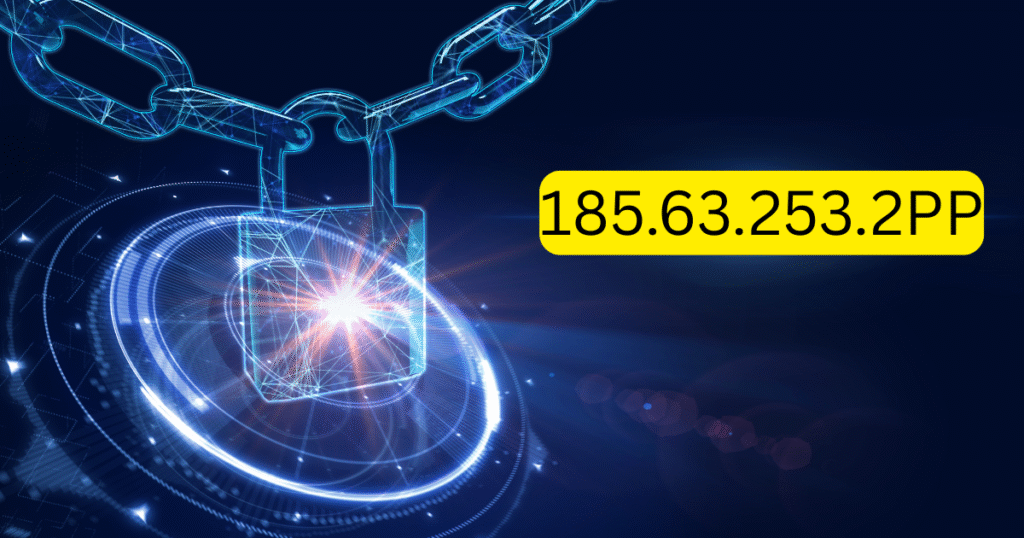Have you come across the term 185.63.253.2PP and wondered, “What does that even mean?” If so, you’re not alone. Tech terms can sometimes sound confusing, especially when they look like a random series of numbers and letters. But don’t worry—we’re here to break it all down in a way that’s easy to understand.
Whether you’re someone trying to improve your online privacy, learn more about cybersecurity, or just stumbled here out of curiosity, this guide will help you make sense of what 185.63.253.2PP is and why it might be important for you.
What is 185.63.253.2PP?
Let’s start with the basics.
185.63.253.2PP isn’t a typical IP address or some secret code from a spy movie. It’s actually most likely a reference to an IP address—185.63.253.2—combined with something known as 2PP. The “2PP” part can point to various things depending on the context, such as a software protocol, a security feature, or even a naming convention used by specific platforms or developers.
To simplify, think of 185.63.253.2PP as a unique identifier—sort of like a digital address or label used in online systems.
But why does this matter?
Because understanding these identifiers can help keep your personal information safer, improve your network performance, and even help you troubleshoot issues on your devices.
Breaking Down the Components
Let’s look at each part separately to help make more sense of it:
185.63.253.2 – The IP Address
An IP address (short for Internet Protocol address) is like your home address, but for your computer or mobile device online. Every device on the internet needs this kind of address to send and receive information.
185.63.253.2 is likely a static IP address, meaning it’s fixed and doesn’t change. These sorts of IP addresses:
- Help with more stable and consistent connections
- Are often used by companies or servers to host websites or applications
- Can sometimes be linked to data centers or VPN services
So, if you see this number popping up somewhere on your network, it could be pointing to a particular server or service.
2PP – What Does That Stand For?
This is where things get a little fuzzy. The letters “2PP” don’t have a universally accepted definition in tech—but based on the context from the original reference, they might serve a specific internal purpose.
It could stand for:
- Second connection in a peer-to-peer (P2P) system
- A code version label used in software development
- A custom tag or naming structure by the owner of the IP address
A good analogy? Think of 2PP like a license plate on a car—it personalizes or identifies a device or service in combination with the “car” (the IP address in this case).
Why Should You Care About 185.63.253.2PP?
You might be asking, “Okay, but how does this affect me personally?” Great question! Here’s why this sort of information can be useful to know.
1. Online Security
Keeping track of which IP addresses your computer connects to can help you detect unwanted intrusions. If you see 185.63.253.2 in your network logs but don’t recognize it, it might be worth doing a quick check.
Some users have reported that certain lesser-known IPs may connect to their devices without clear permission. That’s a red flag and something every internet user should be cautious about.
2. Performance Monitoring
If you’re running a business that depends on online performance—say, an eCommerce site or a work-from-home setup—knowing what IP addresses your services rely on can help when problems arise.
Is your connection slow? Are emails not sending? Maybe the IP address (like 185.63.253.2) is experiencing delays or blocks.
3. Data Privacy Awareness
When your device communicates with unknown or suspicious IP addresses, your personal data might be involved. These interactions can:
- Expose information like your location or browsing habits
- Be part of tracking by third-party software
- Compromise your cybersecurity if not monitored
So, becoming familiar with identifiers like 185.63.253.2PP could add a layer of protection to your online life.
How to Check If This IP Address Is Safe
Let’s say you’ve seen 185.63.253.2PP somewhere in your firewall log or router history. What now?
Here are some quick steps to research it:
- Use a Reverse IP Lookup Tool: Search engines like Whois or IP Location can help you find out where the IP is located and who owns it.
- Check Security Forums or Databases: Websites like AbuseIPDB or BadIPs.com track suspicious activity from IP addresses.
- Scan for Malware: If you suspect something fishy, run a full antivirus scan on your device.
Just like you’d question a stranger knocking on your door, don’t ignore unknown digital visitors either.
Final Thoughts: Should You Be Concerned?
The good news is that 185.63.253.2PP is likely harmless in most cases. It may just be tied to a legitimate server or tool you’re using. But it’s always wise to remain aware and informed.
By paying attention to these digital breadcrumbs, you’re already one step ahead when it comes to protecting yourself online.
Pro Tip:
If you’re ever unsure, use a reliable VPN. It helps mask your IP address, keeps your data private, and gives you more control over who can see your online activity.
In Summary
To sum it up, here are the key takeaways about 185.63.253.2PP:
- It’s likely a combination of an IP address (185.63.253.2) and a code or label (2PP)
- It may be used to identify specific servers, networks, or system configurations
- It’s essential to monitor IP activity for better cybersecurity and performance tracking
- If you’re unsure, do your homework and stay alert to unknown IP access
So the next time you see a weird combination of numbers and letters online—rather than scroll past—it might be smarter to pause, ask a few questions, and investigate.
Stay curious. Stay secure.
Looking for More Helpful Tech Insights?
Check out our blog regularly for more easy-to-understand guides on cybersecurity, internet basics, privacy tips, and everything in between.
Have questions about 185.63.253.2PP? Drop them in the comments—we’d love to help!
